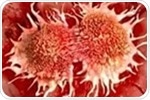| Oncology - Exercise may become part of standard treatment for metastatic breast cancer, study suggests |
|
|
|
|
| |
|
| |
The latest oncology news from News Medical |
|
|
|
 | | |
 10 key factors to improve your cell counting results 10 key factors to improve your cell counting results
Cell counting plays a crucial role in the development and manufacturing of cell and gene therapies as well as regenerative medicine. Modernization of cell counting methods is vital to support the use of these advanced biological products.
This eBook describes considerations and best practices for improving the quality of your cell counting results, based on articles from the ISO Cell Counting Standards.
| |
|
|
| | |  | | |  For patients whose breast cancer converted from lymph node-positive to lymph node-negative disease after neoadjuvant chemotherapy, skipping adjuvant regional nodal irradiation (RNI) did not increase the risk of disease recurrence or death five years after surgery, according to results from the NRG Oncology/NSABP B-51/RTOG 1304 clinical trial presented at the San Antonio Breast Cancer Symposium. For patients whose breast cancer converted from lymph node-positive to lymph node-negative disease after neoadjuvant chemotherapy, skipping adjuvant regional nodal irradiation (RNI) did not increase the risk of disease recurrence or death five years after surgery, according to results from the NRG Oncology/NSABP B-51/RTOG 1304 clinical trial presented at the San Antonio Breast Cancer Symposium. | | | | |  Study demonstrates that inhibiting stromal class I histone deacetylases (HDACs) can effectively slow down pancreatic cancer progression, shedding light on a new therapeutic approach targeting the tumor microenvironment. Study demonstrates that inhibiting stromal class I histone deacetylases (HDACs) can effectively slow down pancreatic cancer progression, shedding light on a new therapeutic approach targeting the tumor microenvironment. | | | | |  A groundbreaking study by researchers at Case Western Reserve University suggests a class of medications used to treat type 2 diabetes may also reduce the risk of colorectal cancer (CRC). A groundbreaking study by researchers at Case Western Reserve University suggests a class of medications used to treat type 2 diabetes may also reduce the risk of colorectal cancer (CRC). | | | | |  Medical imaging often facilitates the successful diagnosis and management of cancerous growths. In particular, magnetic resonance imaging (MRI) is extensively used, especially with contrast agents, because of its high resolution. Medical imaging often facilitates the successful diagnosis and management of cancerous growths. In particular, magnetic resonance imaging (MRI) is extensively used, especially with contrast agents, because of its high resolution. | | | | |  Researchers led by François Fuks - Laboratory of Cancer Epigenetics, ULB Faculty of Medicine, ULB Cancer Research Center and Jules Bordet Institute, H.U.B. - have made a major breakthrough in the understanding and treatment of leukemia. Researchers led by François Fuks - Laboratory of Cancer Epigenetics, ULB Faculty of Medicine, ULB Cancer Research Center and Jules Bordet Institute, H.U.B. - have made a major breakthrough in the understanding and treatment of leukemia. | | | | |  Pancreatic ductal adenocarcinoma (PDAC), that arises from pancreatic epithelial cells, is the most common form of pancreatic cancer, with a very high mortality rate. This elevated mortality is associated with the unique tumor microenvironment (TME), known for increased resistance to chemotherapy and high metastatic potential. Pancreatic ductal adenocarcinoma (PDAC), that arises from pancreatic epithelial cells, is the most common form of pancreatic cancer, with a very high mortality rate. This elevated mortality is associated with the unique tumor microenvironment (TME), known for increased resistance to chemotherapy and high metastatic potential. | |
|
|
|  | | | How would you rate today's newsletter?
| |
|
|
|
|
|
|
|